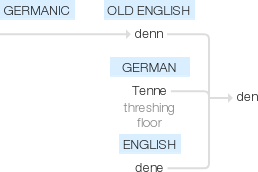Den
Old English denn, of Germanic origin; related to German Tenne ‘threshing floor’, also to dene1.
wiktionary
From Middle English den, from Old English denn(“den, lair (of a beast), cave; a swine-pasture, a woodland pasture for swine”), from Proto-West Germanic *dani(“threshing-floor, barn-floor”). Cognate with Scots den(“den, lair”), Middle Dutch denne(“burrow, den, cave, attic”), Dutch den(“ship's deck, threshing-floor, mountain floor”), Middle Low German denne, danne(“threshing-floor, small dale”), German Tenne(“threshing-floor, barn for threshing”).
From Old French denier, from Latin denarius.
den (not comparable)
etymonline
den (n.1)
Old English denn "wild animal's lair, hollow place in the earth used by an animal for concealment, shelter, and security," from Proto-Germanic *danjan (source also of Middle Low German denne "lowland, wooded vale, den," Old English denu "valley," Old Frisian dene "down," Old High German tenni, German tenne "threshing floor," perhaps from a PIE word meaning "low ground").
Transferred to den-like places in human habitations in Middle English: "secret lurking place of thieves, place of retreat" (late 13c.); "apartment, private chamber" (late 14c.), but the modern use for "small room or lodging in which a man can seclude himself for work or leisure" [OED] is a modern development, originally colloquial, attested by 1771. By 1956, however, at least in U.S., the den had come to be a sort of family all-purpose room. In 19c. it also often had a bad sense, "a haunt, squalid place of retreat" (as in the set phrase den of iniquity for a brothel, etc.).
For, in truth, without a den or place of refuge, a man can achieve neither tranquility nor greatness. Jefferson wrote the Declaration of Independence in a quiet rooming house in Philadelphia. The soaring ideas that went into it evolved during hours of reading and contemplation in a secluded library. Had it been a study-TV-guest-family room, the United States might still be a colony. [The Kiplinger Magazine, September 1956]
den (n.2)
in good den, found in the early dramatists, a contraction of good e'en "good evening;" the phrase was short for God give you good den.
